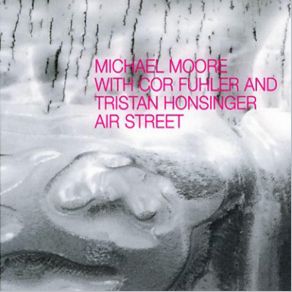Air Street
Download links and information about Air Street by Michael Moore. This album was released in 2002 and it belongs to Jazz genres. It contains 11 tracks with total duration of 01:05:37 minutes.

|
|
|---|---|
| Artist: | Michael Moore |
| Release date: | 2002 |
| Genre: | Jazz |
| Tracks: | 11 |
| Duration: | 01:05:37 |
| Buy it NOW at: | |
| Buy on iTunes $9.99 | |
Tracks
[Edit]| No. | Title | Length |
|---|---|---|
| 1. | Train Chords / Spiky-Haired Boy / Mule Standing In Field (featuring Tristan Honsinger, Cor Fuhler) | 12:29 |
| 2. | Participants (featuring Tristan Honsinger, Cor Fuhler) | 4:29 |
| 3. | Air Street (featuring Tristan Honsinger, Cor Fuhler) | 8:29 |
| 4. | Nobody's Blues (featuring Tristan Honsinger, Cor Fuhler) | 5:13 |
| 5. | Ladida (featuring Tristan Honsinger, Cor Fuhler) | 10:39 |
| 6. | Basket (featuring Tristan Honsinger, Cor Fuhler) | 4:49 |
| 7. | Still Beating (featuring Tristan Honsinger, Cor Fuhler) | 3:42 |
| 8. | Related to Harry (featuring Tristan Honsinger, Cor Fuhler) | 4:22 |
| 9. | De Ford (featuring Tristan Honsinger, Cor Fuhler) | 4:11 |
| 10. | Eyes Fixed (featuring Tristan Honsinger, Cor Fuhler) | 4:13 |
| 11. | Freies Geleit (featuring Tristan Honsinger, Cor Fuhler) | 3:01 |
Details
[Edit]As with this trio's previous release, Monitor, also on the Between the Lines label, this one is a compelling and fascinating ride through the terrain of uncharted free-style chamber jazz. The personnel and instrumentation are the same, too, including Cor Fuhler's performance on the keyolin, which he describes as "a two-string violin on a frame suspended above a small keyboard." Each of the pieces is briefly described by Michael Moore in the CD casing, but the general impression is one of relaxed focus, sometimes building to a moderate intensity, but always bursting with surprises. Part of the fun is the diversity of instruments, with Moore and Fuhler participating on a total of seven different ones between them. The results sound hardly eclectic, though, and there are few of the shifting patterns found in, say, the music of John Zorn. Tristan Honsinger's cello is a major force, his lush and springy strings laying a groundwork for the clarinets and keyolin. In abbreviated liners, Moore describes the effort as part of the "Dutch improvised music tradition," which usually means infused with humor, though there is none (or little) of that here. This represents the more subtle side of the Dutch scene (although, to be sure, Honsinger is an American, even if identified in the public mind as a European), with flowing interaction of the moment, the sort of instant composition that ironically seems seamlessly pre-arranged.